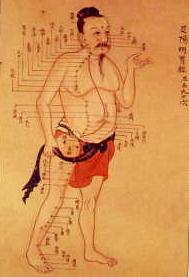 A recent study published by the National Institute of Health looked at the effectiveness of treating chronic kidney disease through the use of acupuncture. Specifically, the researchers were looking at the effects on renal function, by evaluating the levels of serum creatinine and estimated glomerular filtration rate. The study was performed on 53 patients who suffered from chronic kidney disease. Each patient received acupuncture plus electroacupuncture once per week for 12 weeks. The study determined regular acupuncture treatments can lower creatinine levels and increase glomerular filtration rates, which ultimately decreases the symptoms of chronic kidney disease. This allows the patient to lead a more normal life. Kidney disease is the ninth leading cause of death in the United States, with an estimated 31 million people suffering from chronic kidney disease. Decreased kidney function can be either acute or chronic. Acute kidney injury can be caused by a sudden drop in blood flow to the kidneys, damage from medications, infections or a sudden blockage that prevents urine from flowing out of the kidneys. Chronic kidney damage can be caused by autoimmune diseases, genetic disorders, sexually transmitted diseases or even chronic urinary tract infections. Regardless of the cause, decreased kidney function can be deadly if not detected or left untreated. Traditional Chinese Medicine offers multiple methods to help battle decreased kidney function. The kidneys function to filter and purify blood throughout the body. Inadequate blood flow to the kidneys can lead to a host of problems. The most prevalent form of TCM is acupuncture. Acupuncture has been shown to increase blood flow into areas lacking, thus allowing the transport of vital nutrients that keep the tissues healthy and functioning properly. Acupuncture can help relieve clinical symptoms of kidney disease, such as fatigue, back pain, headaches, nausea and vomiting. According to TCM, the kidneys are the source of yin and yang. Yang is fire and yin is water. When the fire of yang is weak or the water of yin is not nourishing the body, then the kidney function must be addressed. The kidneys also house essence or jing in TCM. Jing is similar to our DNA. Since the kidneys are the most deep-seated of the internal organs, they are responsible for providing the tools to fulfill the deepest needs, such as survival and reproduction. While the kidneys house the deep reserves that fuel the body, they are also the organs damaged the most by stress. The body’s bones and marrow are governed by the kidneys in TCM. This means that even illnesses like osteoporosis can be related to the kidneys and as such, when treating a person with these ailments, the kidney meridian must always be included in the treatments. Regular acupuncture treatments can greatly improve the health of the kidneys. But it is also important to keep stress levels at a minimum. This is where things like meditation, tai chi and qi gong come into play. All of these practices help calm the mind and relieve stress. It is also recommended fear be avoided or managed, as it can deplete the energy of the kidney meridian. Physically, the kidney meridian manifests in the lower back and knees. Therefore proper stretching and exercises to strengthen the back and leg muscles are extremely helpful in supporting overall kidney health. Certain foods can also help improve kidney health. In particular, dark foods like black beans, black walnuts, as well as seafood are all excellent kidney tonics. All of the aforementioned items can be provided by a properly trained and fully licensed acupuncturist. So if you or somebody you know is suffering from decreased kidney function or kidney disease of some sort, it would be beneficial to contact me today. TCM coupled with Western medicine can help anybody suffering from these kinds of issues. The two modalities complement one another nicely and allow for the patient to lead a more normal life.  The adrenal glands are endocrine glands that produce multiple hormones. The adrenals are located directly above the kidneys and they are vital to human existence. The hormones produced by the adrenals are particularly important during times of stress. Adrenaline and naturally occurring steroids such as aldosterone and cortisol are made by the adrenals. These hormones help the body control blood sugar, burn fat, react to stressors and regulate the blood pressure. This makes the adrenals extremely important. Traditional Chinese Medicine views things differently than Western medicine, but the adrenal glands are still an important part of the body. TCM treats the adrenal glands as part of the kidneys and the kidney energetic pathway. This means the adrenal glands are part of the water element. The kidney area is seen as a key role player that determines the quality of life in TCM. This is because the kidneys control the internal Qi (pronounced “chee”), which is considered the body’s life force. The body is a complicated machine that has a very efficient self-regulating system. When the body is depleted of quality food or sleep, then it will not be able to function and carry out all the important functions. This is why many people experience eating binges or extreme fatigue accompanied by excessive sleep when they are under severe stress. Everyday stress can drain the body of energy, nutritional reserves and Qi over time. When this occurs, the body may experience a breakdown, a drop in immunity or great fatigue. If this continues, adrenal fatigue may develop. Adrenal fatigue is a condition where the adrenal glands become weak and then produce insufficient amounts of the hormones needed for everyday life. Symptoms of adrenal fatigue include low libido, food cravings, general malaise, emotional problems, weight gain, low immunity, difficulty concentrating and thyroid issues. TCM offers a couple of possible solutions to treating weakened adrenal glands. Acupuncture treatments and moxibustion can greatly help the adrenals. Regular acupuncture treatments can strengthen the kidneys. Over time, the adrenals/kidneys will regain some of their Qi, thus helping the body to fuel and heal itself. Acupuncture is so effective because it helps reduce stress and it turns on the relaxation part of the nervous system. When the relaxation side of the nervous system is turned on, the heart rate will return to normal, digestion will improve and sleep will become deeper and more restful. Moxibustion is another tool in the TCM toolbox that can help heal the adrenal glands. Moxibustion is the burning of a dried herb, specifically mugwort. The mugwort is placed on specific acupuncture points that are known to tonify or improve the Qi associated with the kidneys/adrenal glands. Both moxibustion and acupuncture can be performed frequently to help bring the body back into balance. Incorporating healthy eating habits, regular exercise and restful sleep can also keep the adrenal glands performing well. But when we are stressed, many of the things we know are good for us, tend to get moved to the back burner. This is where getting regular acupuncture treatments can be very beneficial. So if excessive stress is a factor in your life, consider adding acupuncture treatments that can help you relax mentally and keep you healthy physically.  The major responsibility of the heart in TCM is housing the mind and controlling the shen. “Shen” can be seen as the overall healthiness of the mind. When you look at a healthy person in good spirits, you know how you can see that in their eyes? There is a certain bright clarity and sense of health that shines from within. We acupuncturists would say that this person has good shen. Have you ever looked into a person’s eyes and noticed they seemed, well, not all together? Maybe their eyes were shifting from side to side, or maybe they just seemed cloudy and dull, as if they were not really in the present moment. Perhaps they seemed dazed or confused. This is poor shen. Sometimes mild depression or distraction can cause this shen disturbance; if very severe, it can manifest as mental illness, such as schizophrenia. A Chinese Medicine professor once described the heart’s job as maintaining appropriate timing in life. He used an example of a person wearing a bathing suit. If this person wore the suit out to the pool in the summer, his heart was doing its job. But if he put the bathing suit on for a business meeting, it meant the heart was not allowing him to make the right choice for the circumstances. In short, the Heart is all about maintaining the correct behavior for specific situations. Think about behavior patterns you might see in the case of mental illness: inappropriate speech or tone of voice, making unsafe decisions, misjudging situations and social cues. The heart is not about moderation; it is an organ of extremes, from wild joy to crushing lows. Extreme joy may seem like a positive thing, but this is the type of joy unsustainable and it burns out quickly. Think of manic-depression: manic highs, followed by deep depression. Both depression and anxiety are linked to the heart. ADHD is also considered to be a result of heart imbalance; the hyperactivity is a result of the heart not properly controlling the mind.  In Traditional Chinese Medicine, the heart is the organ most closely linked to emotion. Think about all the terms we use every day to describe our state of mind: “heartsick,” “heartbroken,” “heartache” The heart is not the director of subtlety; the emotions it encompasses seem to always be on the far end of the spectrum, either extreme sadness or extreme joy. The physical job of the heart in TCM is very close to what we know it to be in Western medicine. It controls the blood vessels, and also controls the sweat. If the heart is healthy, the heartbeat will be strong and regular, without palpitations. The blood pressure will be normal, the blood will circulate well, and the heart will settle back into its regular rhythm shortly after exertion. You may notice people with heart issues tend to sweat more than the average person. Excess sweating is a sign the heart needs to be tonified (built up and supported). Heat signs in general, such as facial flushing, might be a sign that the heart energy is out of balance. On the other end of the spectrum, if the energy is deficient, a person may present with a complexion that is pale or chalky. The heart energy also controls the tongue. When this organ is working effectively, your tongue will work to help you taste your food, and to assist normal, clear speech. Stuttering, loss of words and other speech difficulties can result from a deficiency of the Heart. If someone talks incessantly, this can also point to an imbalance of the heart. If there is excess heat in the heart, it may show up as sores on the tongue, and the tip may be red or painful. When the heart is balanced and healthy, it results in an easy transition into sleep. When we acupuncturists learn you have insomnia, we often treat the heart. Difficulty falling asleep, nightmares and sleep terrors can result when this organ is unhappy. If you are the type of person who lies in bed forever, unable to fall asleep because your mind is racing, acupuncture can help to settle the heart energy and give you a great night’s sleep. |
AuthorsRebecca M H Kitzerow is a Licensed Acupuncturist practicing in La Center, Washington. With over a decade of experience she has won 10 Nattie consumer choice awards from Natural Awakenings Magazine since 2014. Archives
July 2024
Categories
All
|
Photos from Hey Paul Studios, BeGreen_Studio, Pawel Pacholec, 1950sUnlimited, toulupaliaqaz, Joelk75, OnTask, Robert Gourley, cnu_sports, Mitya Ku, wuestenigel (CC BY 2.0), FootMassagez, 401(K) 2013, Mariana Heinz, @EdwardTerry, fishhawk, liverpoolhls, torbakhopper, Boemski, dolomitibl, Driscolltheque, Dave n Laura, Vaping360, MVWorks, Life Mental Health, MVWorks, mikefats, Scot Nelson, jfl1066, wZa HK, ruurmo, Guadalupe Cervilla, Army Medicine, GViciano, torbakhopper, adrigu, Saulo Cruz, Ben Cumming, marniejoyce, kcxd, JasonCorey, kanenas.net, Live to Create Photography, gm.esthermax, Unique Hotels Group, Zenspa1, mysiana, Tobias Lindman, Leader Nancy Pelosi, Kristoffer Trolle, swanksalot, Bill Selak, Parker Knight, stimpsonjake, Gedankensprudler, SuperFantastic, tonynetone, marniejoyce, JeepersMedia, Illusive Photography, 'Ajnagraphy', Iban Torras, scotted400, gtall1, dvanzuijlekom, BPPrice, Skley, torbakhopper, Renato Ganoza, anka.albrecht, QUOI Media, Public Domain Photos, Instant Vantage, Victor Tongdee, Free Grunge Textures - www.freestock.ca, sportEX journals, Nadja Tatar, angela n., marniejoyce, MVWorks, Karolina Kabat, Thomas Fisher Rare Book Library, UofT, ginnerobot, tracilawson, haven't the slightest, My Photo Journeys, Pierre Willemin, Florena_Presse, SuperFantastic, colindunn, zzkt, TraumaAndDissociation, ER24 EMS (Pty) Ltd., shixart1985 (CC BY 2.0), marniejoyce, Tomás Fano, freestock.ca ♡ dare to share beauty, Archives New Zealand, Jaykhuang, airdrie.m, Go-tea 郭天, OnTask, wuestenigel, focusonmore.com, Disney | ABC Television Group, Andrew Gustar, Didriks, ConstructionDealMkting, charlywkarl, barnimages.com, Lel4nd, runwaypilates, michaelstephanfotografie, McLevn, TraumaAndDissociation, eLife - the journal, Lars Plougmann, wuestenigel, shixart1985, boviate, davis.steve32, kevin dooley, @the.photoguy (insta), frederic.gombert, Feathering the Nest, Victor Tondee, shixart1985, wuestenigel, Joe K Gage, kennethkonica
 RSS Feed
RSS Feed
